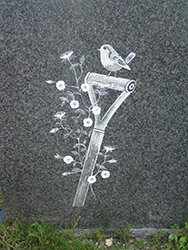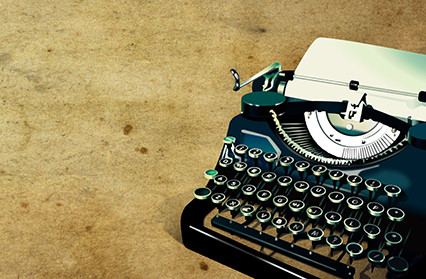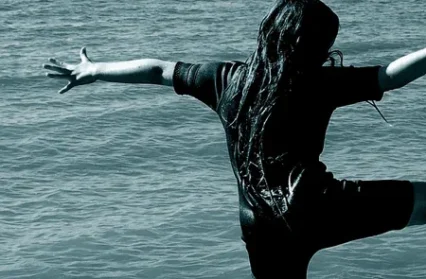Award-winning poet and writer Nuala Ní Chonchúir travels to Paris in her short story, ‘In Seed Time, Learn’.
The light bulb over the table burst and the kitchen went dark; bits of bulb glass landed in my hair and I shook my head and swiped them away.
‘Shit,’ Imogen said, reaching across to touch my arm, ‘it must be a power surge.’
‘It’s Dana,’ I said, standing up, ‘she’s dead.’
 ‘For fuck’s sake, Sonny. What are you talking about?’ Imogen snapped her hand away and fumbled towards the hall. ‘This one’s gone too,’ she shouted. I heard her bump into the coat-stand and curse, then head up the stairs to the nursery.
‘For fuck’s sake, Sonny. What are you talking about?’ Imogen snapped her hand away and fumbled towards the hall. ‘This one’s gone too,’ she shouted. I heard her bump into the coat-stand and curse, then head up the stairs to the nursery.
I knew Dana was dead, as surely as I knew anything. And although I had weaned myself off the idea of her – of us – I felt panicked at the thought of never seeing her again. I sat down, my mind pulling backwards to Dana and our pact: when one of us died, we had said, the light bulbs in the other’s house would blow. All of them, spectacularly. We had made this deal as twelve-year-olds, cooped in the hut we had built in her garden, high on each other’s salt and clay smell, our mouths raw from a long ‘session’.
‘Are you up for a session?’ Dana would say, standing at my parents’ hall door; I would nod and follow her to the hut. There we would huddle and kiss, locking lips and licking the insides of each others mouths, stopping and starting to perfect some flick or linger of the tongue. Dana made it clear, after each session, that we were not boyfriend-girlfriend.
‘It’s practice,’ she would say, ‘for when we meet someone to love.’
Dana was an adult-in-waiting, impatient to slough off her child’s skin and become a real person; I followed behind.
But I don’t want to get quagmired in childhood memories; whole seasons and geographies are rearranged in my head, with the truth a wispish version of itself. Now she is dead and I would rather talk about Dana as I knew her last; the Dana who became my lover.
* * *
I hadn’t been on a plane in a while – Imogen has never liked to fly – and I felt foolishly important and pleased with myself. I chose a window seat, so I could watch the take-off. Nobody sat beside me and I was enjoying the wonder of the views from the window: sheep like grains of rice scattered on fields; a lumpy swathe of sea pocked with ferries; the contrail of another plane morphing from a thin to a puffed out line. My mind was mulling these things – as well as the research I was on my way to France for – when I felt a hand on my knee. Forgetting Imogen was back at home, I cupped my hand over it and squeezed. Then, as if I had been bitten, I snatched my hand back and turned sideways; Dana was grinning at me, her pinch-pale face barely changed in twenty-five years.
‘Hello, Sonny,’ she said.
‘Dana, my God. Wow.’ I hugged her, breathing her earth and sweat scent, doused now in perfume. ‘How are you? You’re here.’
‘Yes, I’m here. And I’m grand. Grand.’ She pulled her hands over her dark Joan of Arc hair, tamping it down. ‘So, Paris?’
‘Yes, for a week. I’m researching the origins of Irish apples, for a radio show.’ I smiled at her. ‘You should hear the names, they’re gorgeous.’ I told her about the Orléans Reinette, the queen of sweet, dry apples; about the Bloody Butcher and the heart-shaped Cavan Strawberry. ‘There’s even one with my name,’ I said.
‘The “Sonny”?’
‘No, the “Valentine”.’
‘What’s that one like, tasty?’ She smiled and I thought how great she looked – a child stretched out into a perfect adult.
‘The Valentine’s a little dry. Large too, and a bit uneven.’
‘Very apt.’
We both laughed; I felt my face redden and looked away.
‘Sorry, I’m waffling.’ I said. ‘What will you get up to in Paris?’
‘Not much. Sleeping, eating, drinking. Walking.’
‘We should get together.’
‘Yeah, Sonny, I’d like that,’ Dana said.
I studied her face, trying to gauge if she meant that; midlife paranoia had started to creep in and I second-guessed everyone. I was really hoping we would meet.
* * *
We had Tarte Tatin for dessert in Le Grenier de Notre Dame; the pastry was burnt underneath but the tier of apple slices was sour-sweet and delicious. I picked at some toasted almonds and watched Dana suck slivers of caramelised fruit off her spoon; I was surprised at how well I remembered her lip-shape: thin, with an appealing red bump at the bow.
She had taken my hand when I met her in the foyer of her hotel; she held it all the way down Boulevard Saint Michel, on our way to the restaurant, and I left it there, not knowing what else to do. Her gloves were crimson leather, mine were black; I thought, incongruously, of the wolf leading Red Riding Hood into the wood.
‘Cold,’ I said.
‘But not raining.’ Dana squeezed my hand.
There was a mix of the familiar and the new in being around her and I had a giddiness in my chest that I hadn’t felt in years. I was skittish, chatty, wanting to discuss things that were about us, and only us. Wine often made me like that – gregarious and life-loving – but I recognised that there was something else here; something that I was playing for and that I wanted.
‘Do you remember our “sessions”?’ I said, when we had scraped the last of the spicy apple off the pastry and into our mouths.
Dana giggled. ‘Of course I do. It was all worth it; people tell me I’m a great kisser.’
I looked at her mouth again. ‘Do you want to go for a wander?’ I said.
‘Sure.’
We linked arms as we headed towards the Seine and the hulk of Notre Dame. Part of me wanted to feel tense – like a betrayer – but it was as if my life with Imogen existed on another plane, and it was impossible then to muster myself as part of it. I liked the weight of Dana’s arm on mine, the brush of her coat; I felt I had always been with her, or that I should have been.
We stood in the square in front of the cathedral with all the other tourists, and examined the rows of angels and saints above the doorway. The outdoor Christmas tree – still clinging on, though it was the end of January – swayed and twinkled, its red baubles bouncing on the branches.
‘It’s incredible,’ Dana said, and I pulled her flush to me and closed my mouth over hers. She tasted and felt the same as ever under my tongue, and I suddenly wanted to cry.
* * *
Her room was small, like most Parisian hotel rooms, but it was clean, unshabby. I didn’t want to bring her to my hotel, it seemed too deliberate. On the short Métro ride to her street, Dana showed me a tiny photo of Marty, her husband, and a ridiculous jealousy winnowed in me.
‘What are we doing?’ I said, standing at her bedroom window, watching the light-beam from the tip of the Eiffel Tower swoop over the roof-tops.
Dana came to me and held me from behind. ‘Whatever you want.’
‘Whatever I want?’ I said. ‘What about this husband of yours?’
‘I’m not some sort of Eve, Sonny, offering you an apple. You have a wife.’ Dana let her arms drop from my waist and sat on the bed.
‘I’m going to go,’ I said.
‘Suit yourself. There are no rewards for doing the right thing.’ She lay down, her back to me.
* * *
The next morning, I took a bus to l’Isle-Adam to meet Monsieur Prudhon of Les Croqueurs de Pommes. The bus made slow progress from Porte-Maillot, across the river and down avenues of schools, office-blocks and apartment buildings. I wondered what it would be like to live in Paris, to struggle through the blockades of language and history and custom. I was charmed by the idea of myself living there, but the reality of it also wearied me. Once outside the city, the bus trundled through the uncluttered landscape of another era: the combed fields were free of pylons and they were edged with stands of slim trees; a lone house appeared every so often, tucked low on the horizon.
I met Prudhon in his office in the town and we talked apples; I scribbled his comments and suggestions for further research into my notebook, then he took me to a street market to try some fruit. While he lifted this apple and that for me to taste, my mind slipped over Dana; I wished I hadn’t left her so abruptly the night before.
* * *
Dana was outside my hotel when I got back, jumping from toe to toe to get warm; she was wide-eyed, as if she could not quite believe the cold.
‘How did the pomology go?’ she said.
‘Great. Come up?’
She followed me into the miniscule lift and we stood close, front to front, looking over each other’s shoulders. In my room, she slid to the floor, her back to the radiator.
‘It’s fucking freezing.’
‘I bought you an apple,’ I said, pulling it from a paper bag.
‘Oh yeah?’ She took it. ‘What’s this one called?’
‘It’s called “I’m Sorry, I’m A Big Eejit”.’
Dana sniggered. ‘Really?’
‘Actually, it’s called a Bisou Rose: a Pink Kiss.’ I sat beside her on the carpet and nudged her with my elbow. ‘I’ll be the serpent if you’ll be Eve.’ She grinned, and grabbed the apple.
I kissed Dana through a mouthful of Bisou Rose; she pushed some of it onto my tongue and we munched the fruit and giggled, juice wetting our lips. Lifting her onto my bed, I undressed her and, while I did, she watched my face. I moved down her body, kissing her throat, her nipples, her breastbone, the small hill of her belly; her skin was as soft as milk and baby-firm. She pushed her head back into the pillow and I looked up at the steeple of her nose, the wide church of her mouth and chin; I slid back up along her body.
We made love slowly and thoroughly, keeping our eyes locked together. It was as if we were tuned to fit and move perfectly; I had never felt as able for sex or as involved. Her arching back and irregular thrusts had me teetering all the time. I came and shuddered, my mouth sucked onto her shoulder; I unbent my arms and lay on top of her.
Dana was morbidly out of breath and she swung suddenly from under me, doubling over and clutching at her chest. Her hands rattled.
‘Are you OK? Did I hurt you?’ I reached for her.
She batted me away. Her shallow panting echoed a far-off curl up on the mud floor of our hut. We were chased by her older brothers, through brambles and across streets and, when we got to the hut, Dana collapsed on the floor, shaking. She was often breathless but, that time, I was afraid; her hands jerked and her eyes looked dead. I ran to her house and told her mother, who sent me straight home. In my memory, their family moved to Dublin very soon after that and we didn’t see each other anymore.
Dana swivelled on the bed and pushed her hands over her sweating face. ‘I have a bockety heart, Sonny. And I’ve been weaning myself off my tablets.’
‘Are you allowed to do that?’
‘No.’ She pulled deep to find some breath. ‘The pills block my adrenaline, but from time to time, I miss it; I want waterfalls of it, so I can feel alive.’
She shivered and I pulled the sheet and blanket over her; I ran my fingers up through her hair, over her scalp.
‘Why are you in Paris on your own, Dana?’
‘Same reason you are. Marty hates aeroplanes. Just like your wife.’
I didn’t believe her.
* * *
We met at Victor Hugo’s house on the Place des Vosges. I got there first and watched children in the square playing on the see-saw and dashing about on scooters and rollerblades, while their parents hovered. Dana trotted under the stone arcade towards me, looking fragile and robust, as only she could; I wondered if she had ever thought about having kids.
We walked the rooms of the Hugos’ apartment, marvelling at the over-the-top wall-coverings and carpets, which all matched in a swirl of brown florals.
‘Imagine this in candlelight,’ Dana said, ‘the absolute gloom.’
‘They must have been loaded,’ I said, looking at the huge portraits of the writer, his wife and family.
Dana pointed at an etching of a beautiful girl with piled, braided hair. ‘I doubt if this one was hung when they lived here. It’s Juliette, his mistress. Well, one of them.’ We both examined the portrait. ‘She was with him for fifty years. Do you think we’ll last that long?’ I frowned and she laughed. ‘The face on you! I’m only joking.’
She walked away, on through the rooms, and I caught up with her beside Hugo’s tiny four-poster bed; she kept her eyes forward and I stood behind her in the cramped space by the bed.
‘This is a one time thing,’ I said. ‘There’s Imogen.’
‘Stop freaking out,’ Dana said, ‘I’m not in love with you, Sonny.’
I felt flat. We shuffled through the rest of the apartment without comment, leaving to walk under the arcades to rue Saint Antoine; we filed into the first bistro we saw. I ordered coffees and watched the waiters rush and fuss, keeping their hierarchy intact.
‘I often think about Marty being unfaithful and leaving me. It’s a kind of torture but it keeps up my interest, makes him precious to me.’ Dana stirred sugar into her coffee. ‘Now here I am with you.’ She stared at me. ‘Why, I wonder? So he doesn’t get in there first? To prove something to myself? Jesus, it’s so tired.’
‘It doesn’t feel tired. I love being with you,’ I said.
‘But it’s a one time thing, right?’
‘It has to be, Dana.’ I tapped my spoon on my cup. ‘Imogen is expecting; she’s due in March.’
‘Fuck. Why didn’t you say something, Sonny? Congratulations.’ She pulled her fingers over her hair, making a dark helmet of it. ‘Yeah, congrats.’
‘Thanks,’ I said.
* * *
Imogen felt the change in me; I stayed away, working and reworking the radio programme. I was wary of touching her. She complained that I was never home, that she was lonely. I watched her grow as if from a distance, our unborn daughter making a ripe fruit of her small body. We bought a pram and a cot and I told her about Dana.
‘Are you in love with her?’ Imogen said, her face collapsed.
‘What? No. God, no. It was just a thing. Some…thing.’
‘You didn’t have to tell me.’
‘I’m sorry. It was making me sick.’
Imogen went to stay with Vanessa, her sister.
The first night she was gone, I called Dana’s mobile but it rang out; I had nothing to say to her anyway. Nothing to offer. Imogen came home after three days. She stood in the doorway of our bedroom, cradling her bump, looking at me as if I was a stranger.
‘Vanessa’s harder to live with than you,’ she said.
‘Did you tell her what I did?’
‘I wouldn’t embarrass myself.’
When Eve was born, we made a pact: we would work harder on being close; we would be a tight family. United. And when I promised that to Imogen – fidelity and unity and strength – I really felt like I meant it. So when Dana died, I didn’t go to her funeral, in case Imogen took it as a betrayal. Dana’s husband left two messages about the arrangements on my voicemail; he sounded matter-of-fact, impatient, hurried; and he had a French accent. I wasn’t expecting that.
Born in Dublin, Ireland, in 1970, Nuala Ní Chonchúir is a fiction writer and poet. She has published one novel, four collections of short fiction and three poetry collections – one in an anthology. Nuala holds a BA in Irish from Trinity College Dublin and a Masters in Translation Studies (Irish/English) from Dublin City University. She has worked as an arts administrator in theatre and in a writers’ centre; as a translator, as a bookseller and also in a university library. Nuala teaches creative writing on a part-time basis. She lives in County Galway with her husband and three children. www.nualanichonchuir.com
Photograph by Ian Elliott
Banner illustration by Dean Lewis












